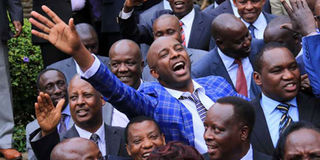Why politics in Kenya is like a centrifugal force, pulling the country apart

Jubilee Members of Parliament celebrate at Parliament Buildings on December 22, 2016 after the passing of changes to the Election Laws (Amendment) Act, 2016. PHOTO | JEFF ANGOTE | NATION MEDIA GROUP
What you need to know:
State and political dysfunction allow the forces exerted by ordinary people to act as the gravitational power that holds the country together to be created and inserted in national life.
If this were not the case, perhaps the wiggle room for citizenship would not exist in most of Africa.
Kenyan politics is like the volcano that just won’t stay dormant. Every few weeks it erupts violently, its lava flowing menancingly.
A few days ago in the battle between the government and the opposition over the amendment of the election law, the country seemed to go through another bout of political madness. For two days, it looked as if Kenya would erupt in violence.
Then, with Christmas closing in, things quieted down. You can fully expect another eruption in a few days.
If you take a deep breath and think calmly, there is something interesting going on here. Not just Kenya, but other countries in Africa – Uganda, South Africa, Nigeria – also go through cycles where someone brings a match to a gas-filled room, and at the very last second, does not light it.
Sometimes, though, as with the 2008 post-election violence, the match is lit, and kaboom!
Politics in Kenya is like a centrifugal force, pulling the country apart. But wearing optimistic lenses for 2017, I think there is a reason it is this way.
After the December 2002 election that brought Mwai Kibaki to power, it was a crisis for the independence party, Kanu, as that ended its 38-year run in power.
So, while the country was swept by the “Second Liberation” euphoria, there was also a sense of gloom for the old order. However, the country got an opportunity early in 2003 to rally around the flag in a non-partisan way with the ICC Cricket World Cup that was co-hosted by South Africa, Zimbabwe, and Kenya from February to March, 2003.
WORLD STAGE
For the “democrats”, it reaffirmed the start of Kenya’s return to the world stage, ending years of isolation of the last Daniel arap Moi years. But it was also an opportunity to celebrate the country without having to gloat in the face of vanquished political opponents.
The rebound of Kenyan rugby and its global success of the past 10 years has also had the same effect, allowing people from across the tribal and political line to cheer something that rises above those divides.
For some reason, athletics – and recent successes in world athletics and the Olympics – do not seem to have equal effect. My suspicion is that Kenya is spoilt in this regard.
It has been winning long distance races for 50 years now, and there is a feeling that any little boy running along the village paths in the Rift Valley herding goats will grow up, get on a plane, and go win the Berlin or London marathon. The sense of accomplishment is, therefore, less.
But it is not only in sport. Every so often, there is a story or a giving spree that challenges the narrative of a country at tribal political war, besieged by a greedy thieving elite.
You never see it coming. There is the story a few days ago of Nairobi street boy Thuo who broke down and cried when he was saw Gladys Kamande, who was sitting in a car with an oxygen tank and a contraption on her face to help her breathe. He gave the few shillings he had begged on the streets, kicking off a campaign to raise money for Ms Kamande’s specialist treatment, and his own quick adoption.
EMMANUEL JADUDI
And there was that remarkable case in 2015, when popular blogger Jackson Biko helped kickstart a drive that raised more than $60,000 in two days for student Emmanuel Jadudi to travel abroad for a brain tumour operation.
At one of its lowest moments in 2008, after the post-election violence, something nearly 14,000 kilometres away did it – the election of Barack Obama, the child of a Kenyan father – as the first black president of the United States.
And in early 2014, in the wake of the acrimonious 2013 election and the bitter political squabbling over President Uhuru Kenyatta and Deputy President William Ruto’s trial at the International Criminal Court, Lupita Nyong’o goes and wins the Oscar and becomes a global superstar.
Safaricom’s M-Pesa mobile money payment solution, considered the world’s most successful, has perhaps had the longest run of countering a narrative of crisis.
Perhaps state and political dysfunction sometimes functions as a necessary evil.
It allows the forces exerted by ordinary people to act as the gravitational power that holds the country together to be created and inserted in national life.
If this were not the case, perhaps that wiggle room that allows for citizenship would not exist in most of Africa.
Charles Onyango is the publisher of Africapedia.com and Roguechiefs.com.
Twitter: @cobbo3





